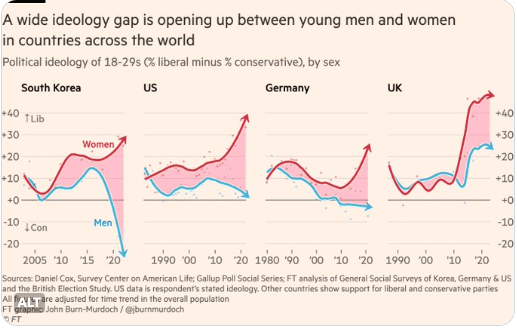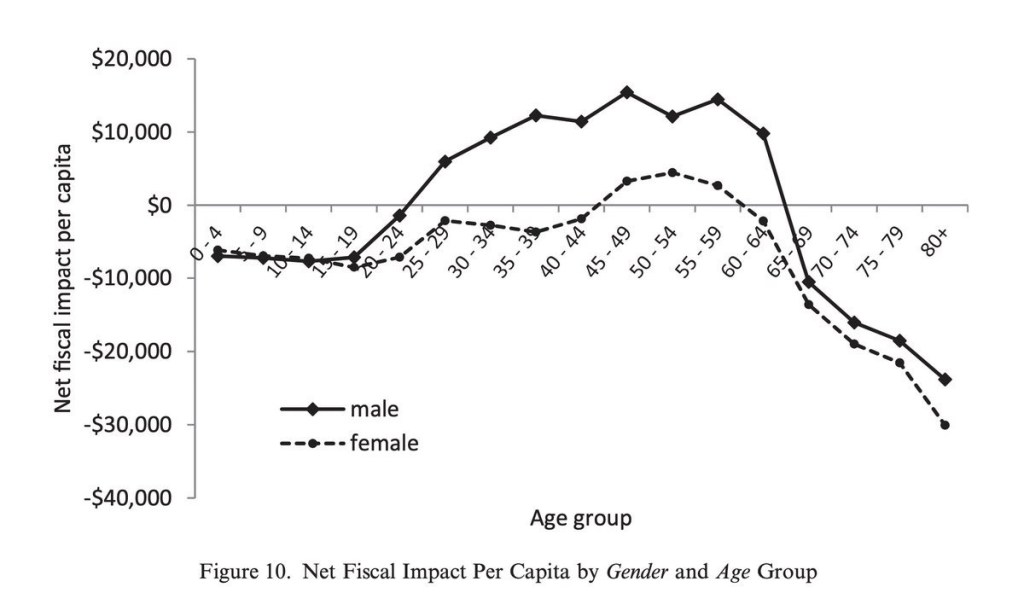Coverage in the UK media of the widening political gap between Gen Z men and women has been predictable and one sided. It was claimed that young men were becoming more conservative and naturally that was a problem. Men, it seems, need to catch up with their more enlightened female peers. Though I am myself of the left, I do not see it as a matter of good versus evil and the implicit assumption that those on the right are morally inferior is not one I share.
The issue was covered on BBC Woman’s Hour wrapped in passive-aggressive faux concern for the boys. The boys were portrayed as helpless individuals attracted to far right figures, like moths to the light. Apparently, they were lost and needed help to reach the stage of enlightenment of their female peers. It was even suggested that men feeling threatened by women was a cause of their supposed rightward drift -The coverage was dripping with matronising condescension – see here

As always, looking at real world data rather than feminist opinions, a different picture emerges. Other than South Korea, young men are not drifting to the right. Rather, women are becoming hyper liberal. I think it is a mistake to call this left. The contempt of middle class feminists for working class men is apparent and ‘hyper-liberals’ are certainly not of the socioeconomic left. (For more on this see A Marxist Take on Woke)
In fact, looking at the UK, young men and women are becoming more liberal but women are at a faster rate.
Is this because women are more empathetic?
Some commentators suggested that this split occurs because women are kinder and more empathetic. This is an unlikely explanation. Women have not always leaned to the left. The suffragettes, for example, were virulently right wing and frankly racist, even by the standards of their times. In the mid 1970s in the UK female voters were more likely to vote for the right leaning Conservative Party.
Finally, of course, being hyper liberal does not really equate with kindness and compassion. It is ‘progressives’ who want to close down voices with whom they disagree, they are more likely to block people on twitter and would be more strongly opposed to their children marrying someone of a different political persuasion. Their form of kindness is a limited form that is only applied to those who think exactly the same way as them.
What is radicalising young women?
This question was seldom asked by commentators. It was as if only young men looked at the internet and were influenced by social media while young women operated on a higher plane of understanding. This conceit does not hold water. The difference is that feminism is mainstream and has become an unassailable belief system. Women and girls do not have to look further afield for supportive material it is the air they breathe the water they swim in.
Another factor is likely to be higher education. Not only do more women attend university but they are more likely to attend humanities departments which have become cradles of intolerant hyper liberalism. In turn, those humanities graduates have come to dominate journalism to its detriment (see post Lit Crit Femsplainers).
The failure of left leaning political parties
The failure of left leaning political parties to create an attractive offering to boys and young men has also served to widen the gap between women and men. Men and boys are demonised and seen as nothing more than accessories to women. The Labour Party manifesto of 2019 contained numerous mentions of women and girls and what needed to be done to improve their lives but men and boys were only mentioned twice and then in a negative way. No surprise that Labour scored badly with young men. See blog post The Labour Party’s Problem with Men.
Similarly, when an All Party Parliamentary Group (APPG) for Men and Boys was being established it was a struggle to get any left leaning politicians involved. The Labour Party was late to the table and then seemed embarrassed to be associated with it. Notwithstanding that, there were 17 APPGs looking at specifically female issues all of which had Labour Party representation. See post APPG for Men and Boys.
Then there are frankly misandrist performances from left leaning MPS. Take, for example, Jess Phillips’ disastrous performance where she gurned and sneered at the idea of a debate on men’s issues, in general, and suicide in particular – see below.
Greater openness of right leaning parties
I am of the socio-economic left, so I found the Labour Party’s indifference to the issues affecting men and boys disappointing and perplexing. By contrast, the right leaning Conservative Party has recognised that there are problems affecting men and boys that require attention. For example, MPs such as Nick Fletcher and Ben Bradley were founding members of the APPG for men and boys. While their politics differ from mine I congratulate them for helping to shift the Overton window in a small way. Left leaning parties need to up their game.
Women benefit more from the state
Another reason for the leftward drift of women may be that they are more dependent upon or benefit more from the state. For that reason, they are more likely to back political parties invested in the ‘big state.’
If you look at the net fiscal impact of men and women over their lifetimes an interesting picture emerges. Looking at the data from New Zealand below, over a lifetime men make a greater fiscal impact thus befitting the economy. This is not because of laziness the part of women but shows the impact of child rearing and I suspect more women retiring early and choosing to work part time. There are means of spreading this wealth that men generate, one is marriage and another is the state – for that reason, women may be more invested than men in the state.

There are many examples of this,
- Women make a smaller contribution to the state but receive more in terms of state pension because they live longer and, until recently, could retire earlier.
- Health care spending is skewed towards women. There are numerous women only health care initiatives and consultations aimed solely at women but no equivalents for men who are blamed for their adverse health outcomes.
- More women than men are employed by the state and benefit from the index linked pensions paid for by the tax payers, most of whom do not enjoy those benefits.
- Education has been rigged to suit women who attend University in greater numbers. These institutions are still, in large measure, funded by the tax payer.
So it may be not moral superiority driving women to the left but self-interest.
Conclusion
The political gap between young men and women might have been an opportunity for some enlightened and mutually curious discussion. Instead, we were given a narrative dripping in matronising condescension. Surely, the BBC amongst other outlets, can do better than this.
It was striking how little analysis there was in the media of the possibility that life was now more difficult for boys than for girls and that this is an explanation of their disgruntlement. Anyone would think those commenting were completely blinkered 🙂
LikeLike
Thank you.
I think you are right. However, feminists will never let go of their victimhood.
LikeLike
The far right is currently lead by populist cult men who appeal to the younger lads. No longer lead by true conservatives that behave like their stodgy dads. The young lasses see these demagogs trudging along like the king with no clothes, they are exposed to their less attractive protuberances. They can understand that these populist kretins seek to take away reproductive choices, hopes for equality in education, athletics, and the workplace. The young lads are oblivious to all that. But, does the candidate piss off the electorate, then cool beans!
LikeLike
Except the data doesn’t support your claim. Young lads are not drifting to the right so ‘populist cult men’ are not succeeding in appealing to them. Apart from South Korea men are remaining centered and women are becoming hyper-liberal.
LikeLike
Of course, I must be far from accurate, I apologize profusely. I must be reading too much of leftist media, I am lucky to be set straight.
https://www.businessinsider.com/trump-gop-college-graduates-boomerang-conservatives-desantis-haley-2024-1?amp
LikeLike
Thanks. Perhaps, in my reply I went a little further than I should have done commenting from this side of the Atlantic (UK). I was dependent on the graphs published in the Financial Times. There are, as you have shown, other sources of information.
I appreciate your interest and comments on my blog.
LikeLiked by 1 person